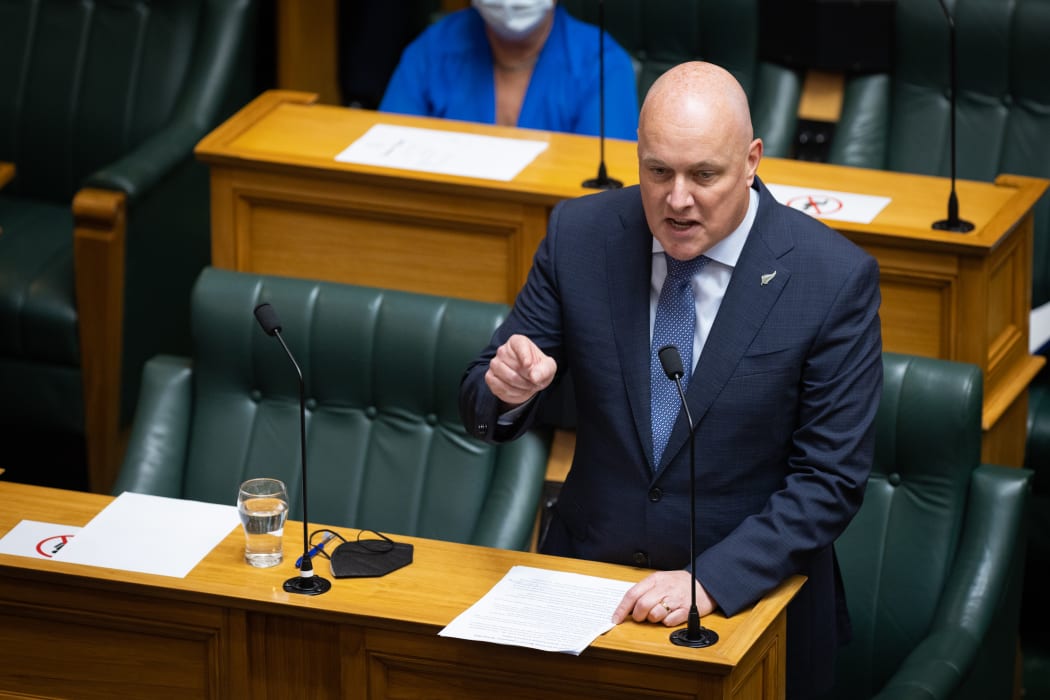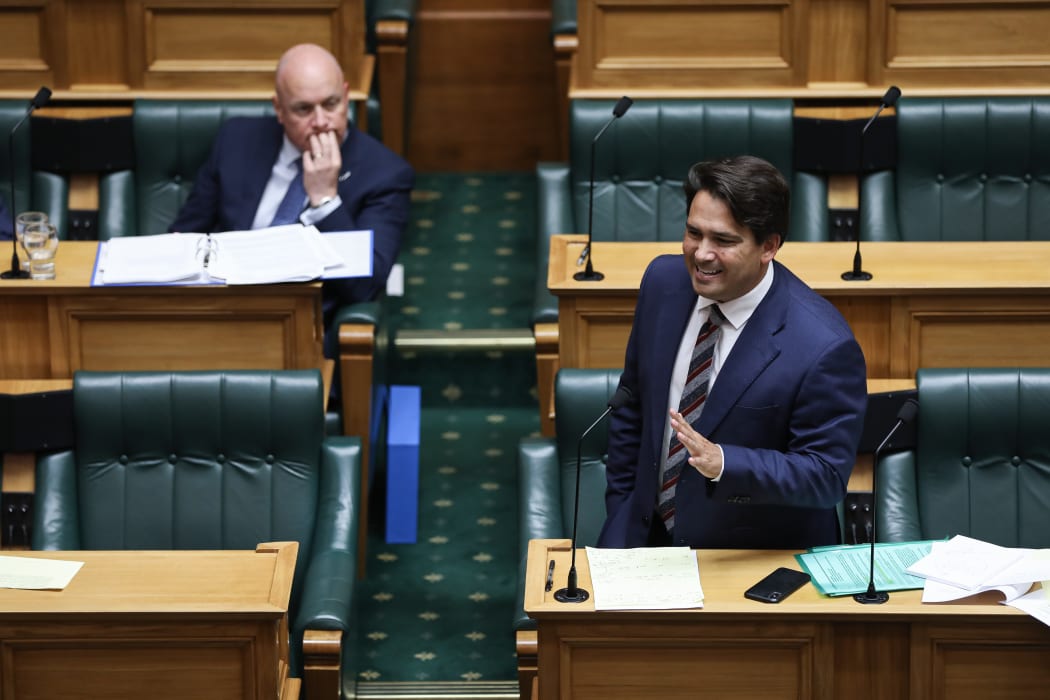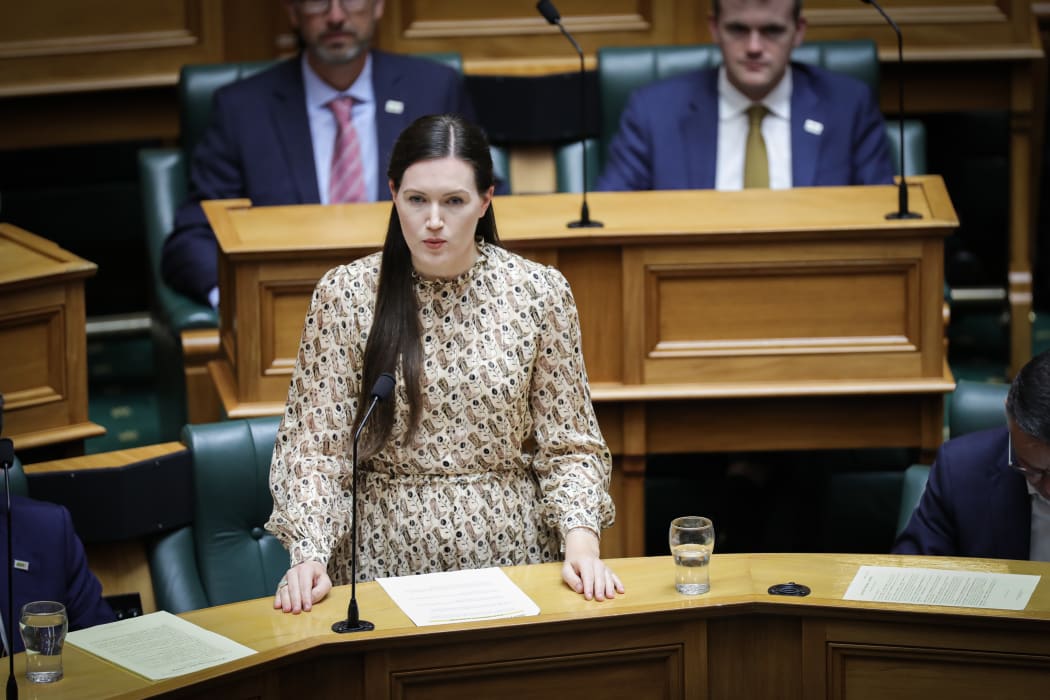Question Times in Parliament this week have been a wide ranging affair but the most common thing mentioned have been costs, cash and a little covid.
The effects of higher inflation are traditionally something of a golden ticket for opposition parties. ‘Stuff costs more’ is a very simple political message. It’s easy to grasp and has a personal impact on everyone. So in the House the opposition have often been loading their big guns with money questions.
Well, most of the opposition ACT were possibly trying a different tactic. But more on that in a moment.

National Party leader Christopher Luxon in the House (file photo) Photo: VNP / Phil Smith
For example on Tuesday National’s leader Christopher Luxon had a plethora of questions related to inflation. House costs, rental costs, and the cost of living. Like this one:
“Does she accept that with prices growing twice as fast as wages, the average earner is worse off than a year ago, and Kiwis are facing a cost of living crisis under Labour?”
Jacinda Ardern in response “...I accept that, currently, we are in an international environment where many economies are experiencing inflation rates not too dissimilar to ours. I've already spoken in this House about the UK, about Germany, about the US, about Canada. But in relation to the member's latter assertion, I don't agree with that. We need only look at since the first quarter of 2018 and the average annual rate increase in wages, which sits at around 3.5 percent, relative to inflation, which has been 2.2 per cent…”.
He was followed up by National’s finance spokesperson Simon Bridges with more of the same - but aimed at the Minister of Finance.

National's finance spokesperson Simon Bridges (file photo) Photo: VNP / Phil Smith
All politics is local (but not all inflation)
The difficulty oppositions have is in tying price rises to local government actions, especially when all countries seem to be having similar experiences.
“If it's so international, how does he explain that just across the ditch, Australia's inflation is 3.5 percent, over 40 percent lower than ours right now?” - Simon Bridges
“If the member wants to get into the most recent statistics there, he should look at the quarterly numbers, which are 1.4 percent and 1.3 percent in the two countries concerned. Inflation is a global issue. I invite the member, if he thinks that the Government is causing specifically inflation by specific spending decisions, to tell us what they are, because so far all we've had is cameras on boats.” - Grant Robertson
Ironically overseas the roles are swapped. In the UK for example it is a Labour opposition that is attempting to tie international inflation to the local Conservative government.
On Wednesday National’s leader widened his brief to include welfare while Simon Bridges tried for costs associated with a coming Health restructure. Other MPs tried attacks in their own specialist areas - immigration, housing, etc. But inflation lurked behind much of it.
…or Covid
The other main topic - as has been the case for a couple of years was Covid. It’s impacts, responses, and rules.

ACT party Deputy Leader Brooke van Velden (file photo) Photo: ©VNP / Phil Smith
For the ACT party, Deputy Leader Brooke van Velden’s questions focussed on Covid. Wednesday was around Covid education rules, while on Tuesday it seemed possible the party was considering making a pitch for the votes of those turning Parliament’s front lawn into a mud pit.
“Does she accept the Government's policy of vaccine mandates is causing significant division and disruption, and, if so, is she open to alternatives?”
The Prime Minister, Jacinda ardern took the opportunity in response to point out that most of the vaccine mandates rules that people blame the Government for rules made by independent businesses. She followed up later “I'd be surprised if the member was advocating that we expressly remove the right of a private enterprise to undertake a policy that essentially would be their own decision, not one for Government.”
Brooke van Velden also tried to draw the Prime Minister into efforts by the Speaker to control the local chaos.
“Does she stand by her statement from yesterday that "I'm not here to pass judgement" in relation to the way that the Speaker turned sprinklers and loud music on the protestors outside Parliament?”
The Prime Minister responded to that and a follow up by noting the two hats she metaphorically wears - Prime Minister versus Labour Party Leader.
Any Government minister is responsible to the House for things they do or are responsible for as a minister. The Prime Minister (as wide as her ambit is) is not responsible for the Speaker.
Speakers are not in the Cabinet and report to Parliament as a whole. The Prime Minister has no special right to manage or judge the Speaker except as an MP like any other MP.
Jacinda Ardern noted that the Speaker had communicated with all of the party leaders and her communications in turn were as a party leader.
That’s a different hat. Prime Ministers answer to the House, but only for what they do as Prime Minister. For their actions as Party Leader they are responsible to the party - or triennially to the wider public.


